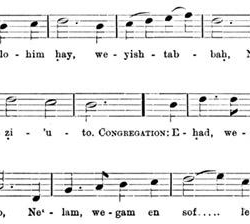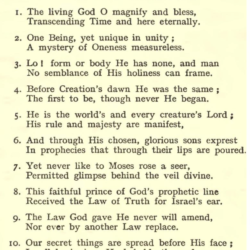| Source (Hebrew) | Translation (English) |
|---|---|
יִגְדַּל אֱלֹהִים חַי וְיִשְׁתַּבַּח נִמְצָא וְאֵין עֵת אֶל מְצִיאוּתוֹ. |
O let us come, the living God adore, He is, He was, He will be ever more. |
אֶחָד וְאֵין יָחִיד כְּיִחוּדוֹ נֶעְלָם וְגַם אֵין סוֹף לְאַחְדּוּתוֹ. |
His Oneness is a thing of mystery, No man can fathom his true unity. |
אֵין לוֹ דְמוּת הַגּוּף וְאֵינוֹ גּוּף לֹא נַעֲרֹךְ אֵלָיו קְדֻשָּׁתוֹ. |
He is without a body’s form or frame, No mortal lips His essence can proclaim. |
קַדְמוֹן לְכָל דָּבָר אֲשֶׁר נִבְרָא רִאשׁוֹן וְאֵין רֵאשִׁית לְרֵאשִׁיתוֹ. |
He reigned before this teeming world was wrought, He was when all this world as yet was naught. |
הִנּוֹ אֲדוֹן עוֹלָם לְכָל נוֹצָר יוֹרֶה גְּדֻלָּתוֹ וּמַלְכוּתוֹ. |
Our God created every living thing, All creatures owe their love to Him, their King. |
שֶׁפַע נְבוּאָתוֹ נְתָנוֹ אֶל אַנְשֵׁי סְגֻלָּתוֹ וְתִפְאַרְתּוֹ. לֹא קָם בְּיִשְׂרָאֵל כְּמֹשֶׁה עוֹד נָבִיא וּמַבִּיט אֶת תְּמוּנָתוֹ. |
He pours on men His prophecies sublime, But none have seen like Moses in his time. |
תּוֹרַת אֱמֶת נָתַן לְעַמּוֹ אֵל עַל יַד נְבִיאוֹ נֶאֱמַן בֵּיתוֹ. לֹא יַחֲלִיף הָאֵל וְלֹא יָמִיר דָּתוֹ לְעוֹלָמִים לְזוּלָתוֹ. |
The Law that God ordained is ever true, It needs no changing; it is ever new. |
צוֹפֶה וְיוֹדֵעַ סְתָרֵינוּ מַבִּיט לְסוֹף דָּבָר בְּקַדְמָתוֹ. |
Our God discerns the promptings of the heart, He knows the deeds we do before they start. |
גּוֹמֵל לְאִישׁ חָסִיד כְּמִפְעָלוֹ נוֹתֵן לְרָשָׁע רָע כְּרִשְׁעָתוֹ. |
The noble man is blessed by a noble life, The fruit of evil is unending strife. |
יִשְׁלַח לְקֵץ יָמִים מְשִׁיחֵנוּ לִפְדּוֹת מְחַכֵּי קֵץ יְשׁוּעָתוֹ. |
Our God will grant our deepest hope for peace, Messiah’s reign will make all hatreds cease. |
מֵתִים יְחַיֶּה אֵל בְּרֹב חַסְדּוֹ בָּרוּךְ עֲדֵי עַד שֵׁם תְּהִלָּתוֹ׃ |
The soul of man is an immortal flame, Let us forever praise God’s eternal name. |
This is the philosophical-creed-as-piyyut, Yigdal, by Daniel ben Judah Dayyan. Yigdal means “Magnify [O Living God]” and is based on the 13 Articles of Faith formulated by Maimonides (1135-1204). Daniel ben Judah spent eight years improving his piyyut, completing Yigdal in 1404. This was not the only metrical presentment of the 13 Articles of Faith; but it has outlived all others, whether in Hebrew or in the vernacular.
The translation appearing here is as found on page 205 of the HaSiddur (“The Prayer Book,” 1957), compiled by Ben Zion Bokser. He adds the following commentary:
The Yigdal hymn is a versified summation of the thirteen principals of the creed of Judaism, as enunciated by Moses Maimonides. These are: God‘s eternity; His unity; His incorporeality; that He created the universe in time; that it is incumbent upon us to worship Him; that He revealed His truth to certain chosen spirits, the prophets; that the primacy of Moses among the prophets; that the Torah is true; that it will not be abrogated in favor of another faith; that God knows the future; that He rewards and punishes those who transgress His will; the belief in the coming of the Messiah; immortality for the departed.
Source(s)


“יִגְדַּל (אשכנז) | Yigdal, by Daniel ben Yehudah (rhyming translation by Ben Zion Bokser, 1957)” is shared through the Open Siddur Project with a Creative Commons Public Domain Dedication 1.0 Universal license.





Comments, Corrections, and Queries